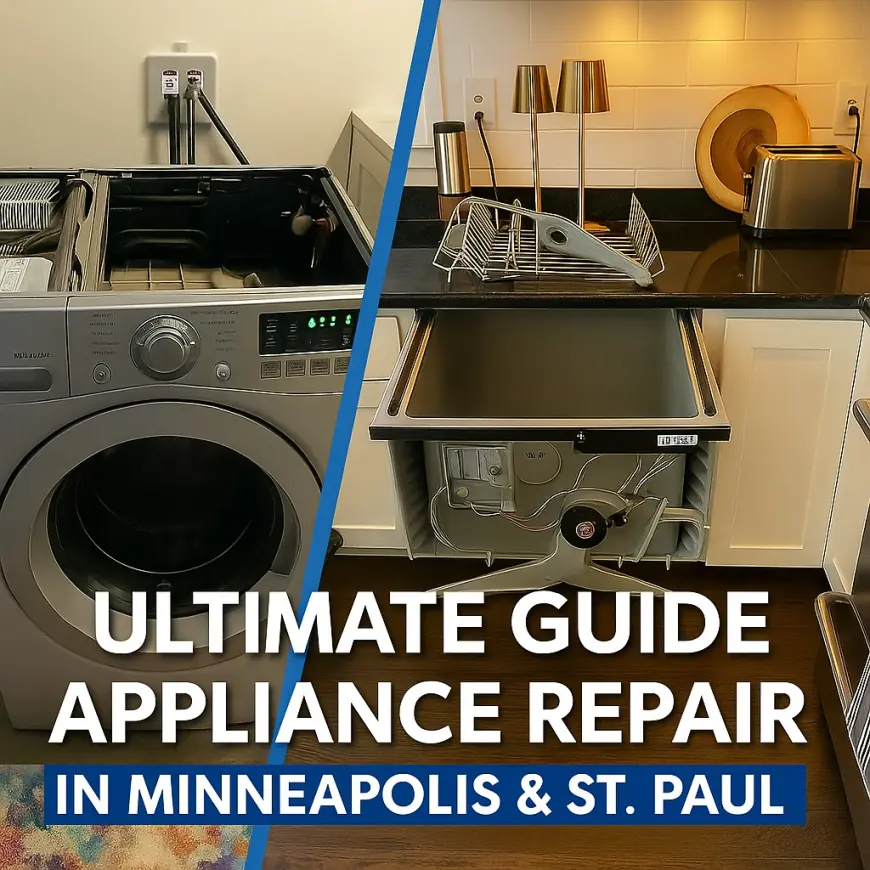Oven Care 101: Tips to Extend the Life of Your Kitchen’s Most Used Appliance
Want to make your oven last longer and perform better? This guide shares essential oven care tips to help you prevent breakdowns, cook efficiently, and avoid costly oven appliance repair. Learn simple maintenance habits that will keep your kitchen’s most-used appliance running like new. Extend the life of your oven with easy maintenance tips. Avoid costly oven appliance repair and boost performance with expert-backed cleaning and care advice.

Whether you’re baking, roasting, or broiling, your oven is one of the hardest-working appliances in your kitchen. Yet, it’s often the most neglected when it comes to regular care. Without proper maintenance, even the best ovens can wear out faster, lose efficiency, or break down altogether—leading to the need for costly oven appliance repair.
In this guide, we’ll cover essential oven care tips that will help extend the lifespan of your appliance, improve performance, and reduce your chances of facing major repairs.
Why Oven Maintenance Matters
From family dinners to holiday meals, your oven handles a heavy workload. But grease splatters, food spills, and high-heat exposure can take a toll over time. Without regular care, issues like temperature inconsistencies, worn-out elements, or electrical failures can creep in.
The benefits of consistent oven care include:
-
Improved cooking performance
-
Lower energy consumption
-
Extended appliance lifespan
-
Fewer unexpected repairs
-
Enhanced safety in the kitchen
Investing a little time in preventive care now can help you avoid calling for oven appliance repair later.
1: Keep It Clean Inside and Out
Why it matters:
Grease, grime, and food residue can cause unpleasant odors, smoke, and even fires if left unchecked. A clean oven also cooks more evenly and efficiently.
How to do it:
-
Wipe up spills as soon as the oven cools.
-
Use the self-cleaning feature (if available) every few months.
-
For manual cleaning, use a non-toxic oven cleaner or a DIY mix of baking soda and vinegar.
-
Clean the oven door and control panel with a mild cleaner and soft cloth.
2: Inspect and Replace Door Gaskets
Why it matters:
The rubber gasket around the oven door ensures heat stays inside. A loose or damaged seal allows heat to escape, leading to uneven cooking and increased energy use.
What to do:
-
Inspect the gasket every few months for cracks, tears, or looseness.
-
If the seal is damaged or compressed, replace it. Most gaskets are easy to order and install yourself.
3: Avoid Using Aluminum Foil on Oven Surfaces
Why it matters:
Many homeowners place aluminum foil on oven racks or floors to catch drips. But foil can block airflow, damage heating elements, or even cause fire hazards.
Better option:
Use a removable oven liner approved by your oven’s manufacturer or place a baking sheet on a lower rack to catch drips safely.
4: Check the Temperature Accuracy
Why it matters:
An oven that runs too hot or too cold can ruin meals and lead to unnecessary use of energy or damaged components.
What to do:
-
Use an oven-safe thermometer to test internal temperature.
-
If there’s a 25°F+ difference between the setting and the actual temp, recalibration or thermostat replacement may be needed.
-
If the issue persists, call a certified oven appliance repair technician for inspection.
5: Don’t Slam the Door
Why it matters:
Slamming the oven door can loosen the hinges, damage the glass, or affect the door seal, all of which impact oven performance.
Practice:
Always close the oven door gently and make sure it shuts tightly after use.
6: Inspect Heating Elements Periodically
Why it matters:
Over time, bake and broil elements can wear out, develop hotspots, or burn out entirely.

How to check:
-
Turn on the oven and observe the heating elements.
-
They should glow evenly without dim spots or discoloration.
-
If they appear damaged or don’t glow at all, it’s time for a replacement—and possibly professional oven appliance repair.
7: Keep the Vent Clear
Why it matters:
The oven vent allows heat and steam to escape. If it’s blocked, moisture can accumulate, damaging electronics or affecting cooking performance.
What to do:
-
Make sure the area around the oven is clear.
-
Periodically inspect the vent opening (usually located at the back or top) and clean it gently.
8: Schedule Annual Professional Servicing
Even with the best DIY care, internal components can wear down over time. A professional technician can:
-
Check for faulty wiring or electronics
-
Test heating elements and thermostats
-
Calibrate temperature controls
-
Prevent future repair issues
If your oven is over 5 years old, yearly servicing is a smart investment to avoid serious oven appliance repair down the road.
Warning Signs You Shouldn’t Ignore
Even with regular maintenance, problems can arise. Call a professional repair service if you notice:
-
The oven doesn’t heat at all or overheats
-
Food cooks unevenly
-
The control panel malfunctions or blinks
-
You smell gas or burning odors
-
There’s visible damage to the heating elements or wiring
Early intervention can save your appliance—and prevent more costly repairs later.
Final Thoughts
Proper oven care is simple, inexpensive, and highly effective at extending the life of your appliance. With just a few regular maintenance steps—like cleaning, inspecting seals and elements, and checking temperatures—you can avoid unnecessary oven appliance repair and keep your kitchen running efficiently.
Don’t wait until something breaks. Start your oven care routine today, and enjoy better cooking results, improved safety, and a longer-lasting appliance.
What's Your Reaction?
 Like
0
Like
0
 Dislike
0
Dislike
0
 Love
0
Love
0
 Funny
0
Funny
0
 Angry
0
Angry
0
 Sad
0
Sad
0
 Wow
0
Wow
0
















































